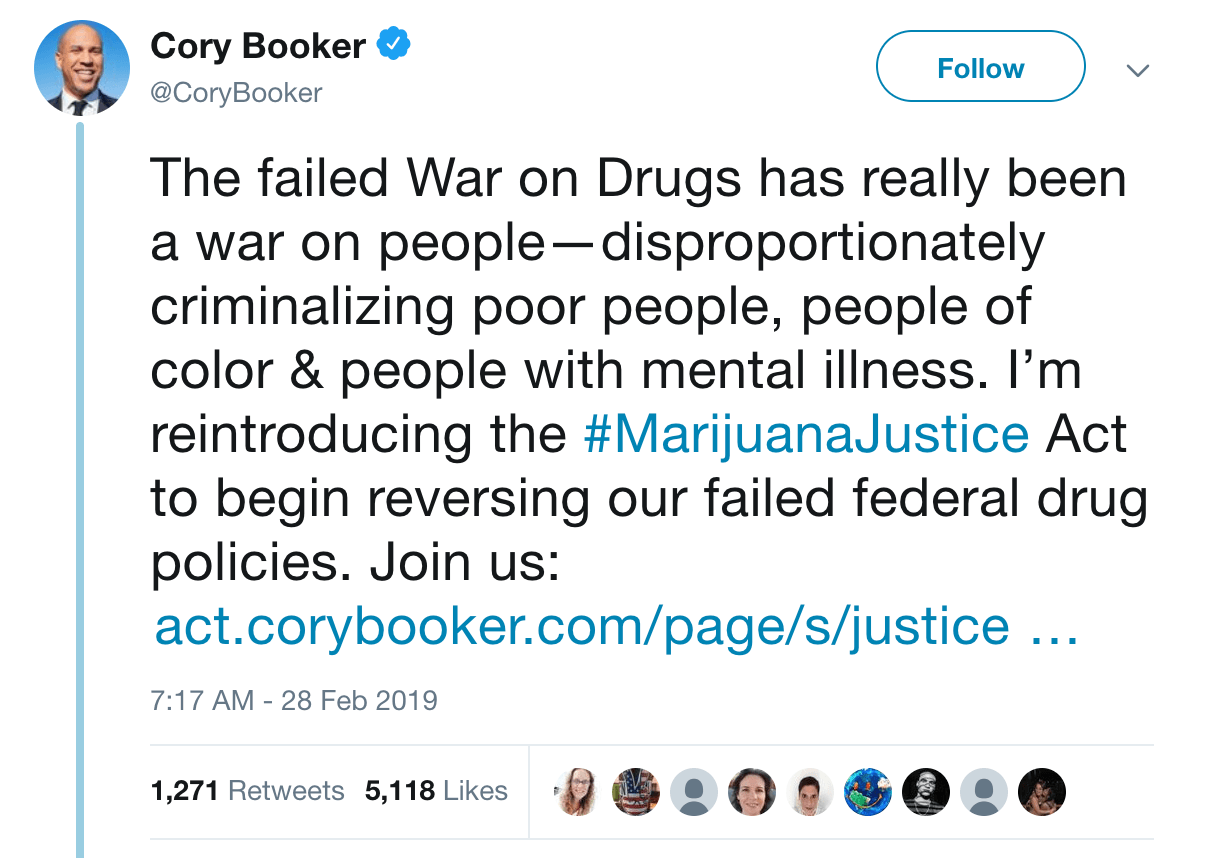Should the Federal Government Legalize Marijuana?
March 19, 2019
On Feb. 28, the day he introduced the Marijuana Justice Act, (S.597) Senator Cory Booker (D-NJ) tweeted, “The failed War on Drugs has really been a war on people—disproportionately criminalizing poor people, people of color & people with mental illness. I’m reintroducing the #MarijuanaJustice Act to begin reversing our failed federal drug policies.”

The views expressed by Sen. Booker illustrate a growing movement to take Marijuana off the federal government’s list of dangerous drugs. From being a target during the War on Drugs, to full legalization of weed in several states, policy approaches to marijuana sales, possession and use have changed radically over the past decade. Despite many strong opponents of federally decriminalizing weed in any form, access for medical purposes up to full legalization has been gaining momentum in the states.
Should the Federal Government legalize Marijuana? As of now:
- Marijuana is legal in 10 states plus Washington, DC
- Thirty-two states, plus DC, allow access to marijuana for medical purposes
- Thirteen states have decriminalized – but not legalized – marijuana possession
- About 73% of Americans support Medical Marijuana access according to a 2010 Pew Survey1
Use this map to learn about marijuana laws in your state
The view of marijuana being legalized federally has not been consistent. Under former U.S. Attorney General Jeff Sessions, the Trump Justice Department took a hardline view of state marijuana laws, rescinding a guidance letter that basically stated that the federal government would not interfere with state marijuana laws. But the new Attorney General, William Barr, stated at his confirmation hearing and after that he would not meddle with states’ marijuana regulations.2 President Trump has indicated he would support the blanket federal legalization of weed.
Those opposed to making marijuana legal and more accessible have a number of arguments, but the two main ones are (1) Marijuana use leads to many detrimental health effects,4 and (2) Legal marijuana means the companies who are ready to take advantage of the newly legal product (“Big Marijuana”) will market the product aggressively both to those who already smoke it and those who are susceptible to advertising, leading to much greater use than under current conditions.5
However, Senator Booker and Representative Barbara Lee (D-CA) want to not only federally decriminalize weed but to mitigate what they view as the harm caused by the War on Drugs and, specifically, the incarceration of those charged with possession of marijuana. According to NORML, and organization that seeks reform of the laws that regulate marijuana, the bill would:
- Remove marijuana from the US Controlled Substances Act, thereby ending the federal criminalization of cannabis;
- Incentivize states to mitigate existing and ongoing racial disparities in state-level marijuana arrests;
- Expunge federal convictions specific to marijuana possession;
- Allow individuals currently serving time in federal prison for marijuana-related violations to petition the court for resentencing;
- Create a community reinvestment fund to invest in communities most impacted by the failed War on Drugs.6
Discussion Questions
- What have you heard about the War on Drugs? Medical marijuana? Marijuana legalization?
- Why do you think these issues are so complicated?
- What are the reasons it might be better for drug-related laws to be written at the state level? What are reasons it might be better to set such policy at the national level? At which level do you believe policy regarding marijuana should be set? Why?
- What are some reasons marijuana should remain illegal? What are some reasons why marijuana should be legal and/or decriminalized? Do you think marijuana should be legal? Why?
- What are some reasons to support the Marijuana Justice Act? What are some reasons to oppose the Marijuana Justice Act?
- Which parts or goals of the bill do you think are most important? Why?
- If you were a Member of Congress and this bill came to a vote, would you vote for it or against it? Explain your vote.
Sources
Featured Image Credit: Joe Raedle/Getty Images
[1] Lopez, German. “Marijuana is legal for medical purposes in 32 states.” 14 November 2018. Vox.com Retrieved 3/17/2018. https://www.vox.com/identities/2018/8/20/17938366/medical-marijuana-legalization-states-map
[2] Lopez, German “The Trump Administration’s crackdown on marijuana might end with Bill Barr.” 28 January 2019. Vox.com. Retrieved 3/17/2019. https://www.vox.com/policy-and-politics/2019/1/28/18200982/marijuana-legalization-trump-jeff-sessions-william-barr
[3] Halper, Evan. “Trump says he is likely to support ending blanket federal ban on marijuana.” 8 June 2018. Los Angeles Times. Retrieved 3/18.19.
[4] Nemko, Marty. “Legalize Pot? You Must Be High!” 7 November 2014. Time.comRetrieved 3/18/19. http://time.com/3573394/legalize-pot-you-must-be-high/
[5] Lopez, German. “The case against marijuana legalization.” 14 November 2018. Vox.com. Retrieved 3/17/19. https://www.vox.com/identities/2018/8/20/17938414/big-marijuana-legalization-corporations-advertising
[6] “Federal: The Marijuana Justice Act.” NORML Action Network. Retrieved 3/18/19. https://actionnetwork.org/letters/federal-the-marijuana-justice-act-of-2017-introduced







